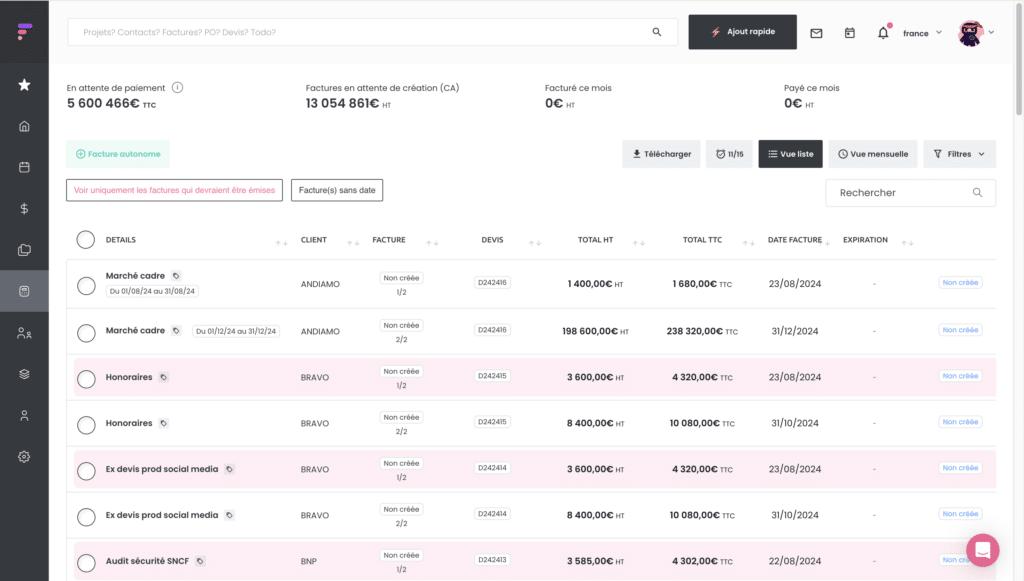An ERP is much more than just management software. It’s an integrated platform that centralizes all key functions of your business, from accounting to production, including human resources. An ERP helps you harmonize your processes, reduce costs, and anticipate the future with informed decisions.
So, whether you’re at the head of an SME or a large enterprise, it’s time to discover how an ERP can truly revolutionize your way of working.
What is an ERP?
An ERP (Enterprise Resource Planning) or Integrated Management Software (PGI) in French, is an ERP management tool that centralizes all key business processes into a single, coherent solution. Unlike traditional software that manages specific functions in silos, an ERP unifies data, activities, and information from different departments to optimize efficiency and decision-making.
With an ERP, users can access a single database, which improves security and reduces errors. It provides an overview of the business’s evolution, thus facilitating planning and analysis of strategic objectives . In summary, an ERP is an essential tool for any company looking to optimize its resources and maximize its operational efficiency.
Benefits of an ERP
Implementing an ERP, much like activity tracking software, represents a strategic turning point for businesses. By centralizing data and automating processes, this system transforms how organizations operate. Here are the main advantages:
- Improved Efficiency : By consolidating all information and facilitating access, an ERP reduces repetitive tasks and optimizes the organization of activities. Users gain time and productivity.
- Cost Reduction: Thanks to unified management, costs are controlled. The ERP eliminates redundancies, streamlines resources, and improves overall project profitability (you can more easily calculate your company’s profit margin, for example).
- Enhanced Security: By integrating specific controls and centralizing information, the ERP ensures a high level of security for all sensitive data.
- Decision-Making Support: Real-time access to key data allows decision-makers to track performance evolution and quickly adjust strategies based on objectives.
In summary, ERP is not just management software: it’s a true revolution that optimizes every aspect of the business, from project tracking to data security.
ERP Modules
An ERP consists of several modules that cover all essential business functions. These modules centralize information, streamline processes, and ensure consistent management of all activities.
- Accounting: This module tracks the company’s finances, from customer accounts to financial statements, including cost management and cash flow.
- Production: It manages the entire production process, from planning to resource optimization, ensuring maximum efficiency.
- Human Resources: This module centralizes employee management, including payroll, recruitment, and performance tracking.
- Inventory and Supply Management: It optimizes inventory tracking, raw material orders, and finished product distribution.
- Sales and CRM: This module facilitates customer relationship management, from orders to invoicing, including interaction tracking.
- Analytical Applications: By integrating analysis tools, this module provides detailed reports to support strategic decision-making.
Each module interacts with the others, ensuring a fluid flow of information and perfect synchronization of services. This modular structure also allows the ERP to adapt to the specific needs of each company, offering remarkable flexibility and scalability.

Choosing and Implementing an ERP
Choosing and implementing an ERP are crucial steps to ensure the success of your project. It involves selecting a system tailored to your specific needs and following a rigorous implementation process.
ERP Selection Criteria
To choose the ERP best suited for your company, it is essential to consider several criteria:
- Company Size and Nature: Some ERP solutions are better suited for small businesses, while others are designed for large organizations.
- Required Features: Identify the essential modules to meet your operational needs, such as accounting, human resources management, or production.
- Flexibility and Scalability: Opt for an ERP that can evolve with your company, adding new features or integrating innovative technologies.
- Data Security: Ensure that the ERP offers strong guarantees for the protection of sensitive information.
Implementation Steps
ERP implementation requires meticulous preparation to ensure its success. After needs analysis and planning, it is essential to carefully organize ERP data migration to anticipate and minimize ERP migration issues, such as critical information loss.
- Needs Analysis: Start with a detailed audit of your current processes and identify areas where an ERP can add value.
- Project Planning: Establish a precise timeline, define objectives, and allocate the necessary resources for each project stage.
- Phased Deployment: Implement the ERP in several phases, starting with critical modules to minimize risks.
- User Training: Ensure that all users are trained to fully utilize the ERP’s functionalities.
- Monitoring and Optimization: After implementation, regularly evaluate the ERP’s performance and make necessary adjustments.
By following these steps, you will maximize the chances of success for your ERP project while minimizing risks and costs.
ERP Evolution and New Technologies
ERPs have evolved considerably over the years, integrating new technologies to meet the changing needs of businesses. Today, they are at the heart of digital transformation, offering increasingly sophisticated and connected solutions.
Integration of AI and Advanced Analytics
Modern ERP systems leverage artificial intelligence (AI) to improve decision-making. AI helps predict trends, optimize processes, and automate repetitive tasks. Furthermore, the advanced data analytics provides valuable insights, allowing decision-makers to rely on real-time information to adjust their strategies.
Synergy with the Internet of Things (IoT)
The integration of applications IoT into ERPs opens up new possibilities for businesses. By connecting equipment and sensors directly to the ERP system, companies can track the status of their operations in real time, optimize production and anticipate maintenance needs.
Accessibility through the Cloud
The cloud has revolutionized ERPs by making these systems accessible from anywhere, at any time. Cloud-based ERPs offer increased flexibility, allowing users to collaborate effectively, even remotely. This accessibility is essential for businesses adopting hybrid or remote work models.
Pop for You's Transformation Thanks to an ERP
The experience of the Pop for You agency, led by Caroline Vignand Olivier, perfectly illustrates how an ERP can transform a business when well-chosen. Integrated into the Human Skills group, this agency has experienced a true revolution in its management of projects and optimization of its resources since adopting the Furious ERP in 2021.
Before Furious: Fragmented and Inefficient Management
Before Furious, Pop for You used several tools to manage its activities. However, this fragmentation often led to rapid abandonment of these tools, making the management of the agency chaotic. As a result, the planning of projects and tracking of time spent on each task were approximate, thus compromising profitability.
The Solution: An ERP for Centralization and Optimization
Adopting Furious allowed the agency to centralize all its information and streamline its processes. The main problem solved by Furious was the management of time spent per project. Thanks to this ERP, Pop for You was able to significantly improve the accuracy of time tracking, which directly impacted project profitability. In particular, Furious’s “sales pipeline” feature, which provides an overview of the evolution of project lifecycles, has been a major asset for the agency.
Results: Time Savings and Improved Anticipation
Since implementing Furious, the agency saves approximately five hours per week, valuable time reinvested in optimizing services. This improvement has allowed Pop for You to better anticipate needs in resources and perfect its organization, particularly regarding staffing. In summary, the ERP has not only improved operational efficiency, but has also changed how the agency operates daily.

Caroline Vignand Olivier - Co-fondatrice de Pop For You
Avant Furious, le grand problème que nous rencontrions était le suivi du temps de projet et donc la gestion de la rentabilité. We relied on intuition and estimates for time spent. Depuis l'adoption de Furious, ce problème a été largement résolu.
In short: Transformed Management
For Pop for You, Furious proved to be much more than just management software ; it has been the catalyst for a profound transformation. By centralizing the management of projects and optimizing the use of resources, the ERP has allowed the agency to move to a higher level in terms of performance and profitability. Today, schedule management, essential for the agency, has become fluid and intuitive, enabling the team to better anticipate and plan its activities.
Conclusion: Continuous Evolution
The Evolution of ERPs is far from over. With the advent of new technologies like AI, IoT, and the cloud, these systems continue to transform to offer increasingly powerful solutions. To remain competitive, businesses must closely follow these innovations and adapt their systems accordingly.
Want to see how an ERP can make a difference for your business? Discover Furious, an innovative ERP solution tailored to the needs of agencies, startups, and consulting firms. Transform your organization, optimize your resources, and propel your business to new horizons. Don’t wait any longer, discover Furious today.

